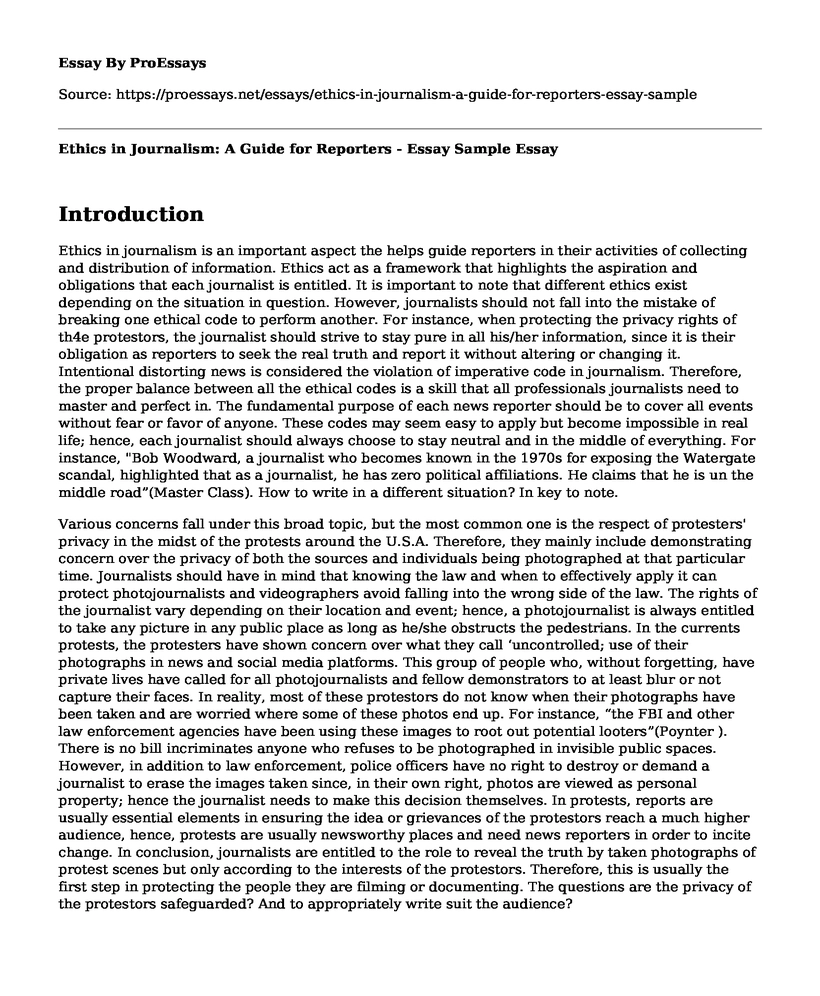Introduction
Ethics in journalism is an important aspect the helps guide reporters in their activities of collecting and distribution of information. Ethics act as a framework that highlights the aspiration and obligations that each journalist is entitled. It is important to note that different ethics exist depending on the situation in question. However, journalists should not fall into the mistake of breaking one ethical code to perform another. For instance, when protecting the privacy rights of th4e protestors, the journalist should strive to stay pure in all his/her information, since it is their obligation as reporters to seek the real truth and report it without altering or changing it. Intentional distorting news is considered the violation of imperative code in journalism. Therefore, the proper balance between all the ethical codes is a skill that all professionals journalists need to master and perfect in. The fundamental purpose of each news reporter should be to cover all events without fear or favor of anyone. These codes may seem easy to apply but become impossible in real life; hence, each journalist should always choose to stay neutral and in the middle of everything. For instance, "Bob Woodward, a journalist who becomes known in the 1970s for exposing the Watergate scandal, highlighted that as a journalist, he has zero political affiliations. He claims that he is un the middle road”(Master Class). How to write in a different situation? In key to note.
Various concerns fall under this broad topic, but the most common one is the respect of protesters' privacy in the midst of the protests around the U.S.A. Therefore, they mainly include demonstrating concern over the privacy of both the sources and individuals being photographed at that particular time. Journalists should have in mind that knowing the law and when to effectively apply it can protect photojournalists and videographers avoid falling into the wrong side of the law. The rights of the journalist vary depending on their location and event; hence, a photojournalist is always entitled to take any picture in any public place as long as he/she obstructs the pedestrians. In the currents protests, the protesters have shown concern over what they call ‘uncontrolled; use of their photographs in news and social media platforms. This group of people who, without forgetting, have private lives have called for all photojournalists and fellow demonstrators to at least blur or not capture their faces. In reality, most of these protestors do not know when their photographs have been taken and are worried where some of these photos end up. For instance, “the FBI and other law enforcement agencies have been using these images to root out potential looters”(Poynter ). There is no bill incriminates anyone who refuses to be photographed in invisible public spaces. However, in addition to law enforcement, police officers have no right to destroy or demand a journalist to erase the images taken since, in their own right, photos are viewed as personal property; hence the journalist needs to make this decision themselves. In protests, reports are usually essential elements in ensuring the idea or grievances of the protestors reach a much higher audience, hence, protests are usually newsworthy places and need news reporters in order to incite change. In conclusion, journalists are entitled to the role to reveal the truth by taken photographs of protest scenes but only according to the interests of the protestors. Therefore, this is usually the first step in protecting the people they are filming or documenting. The questions are the privacy of the protestors safeguarded? And to appropriately write suit the audience?
Works Cited
“What Is Ethics in Journalism? Learn About Journalism Ethics With Tips from Legendary Journalist Bob Woodward”, Master Class, 2019, July 2. Retrieved from https://www.masterclass.com/articles/what-is-ethics-in-journalism-learn-about-journalism-ethics-with-tips-from-legendary-journalist-bob-woodward
“Photographers are being called on to stop showing protesters’ faces. Should they?” Poynter, 2020, Accessed from https://www.poynter.org/ethics-trust/2020/should-journalists-show-protesters-faces/
Cite this page
Ethics in Journalism: A Guide for Reporters - Essay Sample. (2023, Aug 28). Retrieved from https://proessays.net/essays/ethics-in-journalism-a-guide-for-reporters-essay-sample
If you are the original author of this essay and no longer wish to have it published on the ProEssays website, please click below to request its removal:
- The Meaning of Life by Thomas Nagel Essay
- Socrates' Defense of Justice - Essay Sample
- Essay Example on Plato's Theory of Forms: Exploring the Good Life
- Essay on AI Transforming Newsrooms: Automation & Streamlining of Journalism
- Morality of Abortion: Thomson vs Marquis - Essay Sample
- Essay Example on Mill's Argument on Happiness at the Root of Morality
- Paper Sample on Aristotle's Influence on Business Ethics: Eudemian & Nicomachean Ethics







